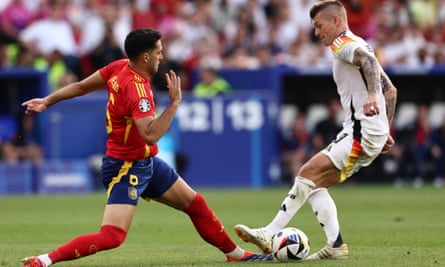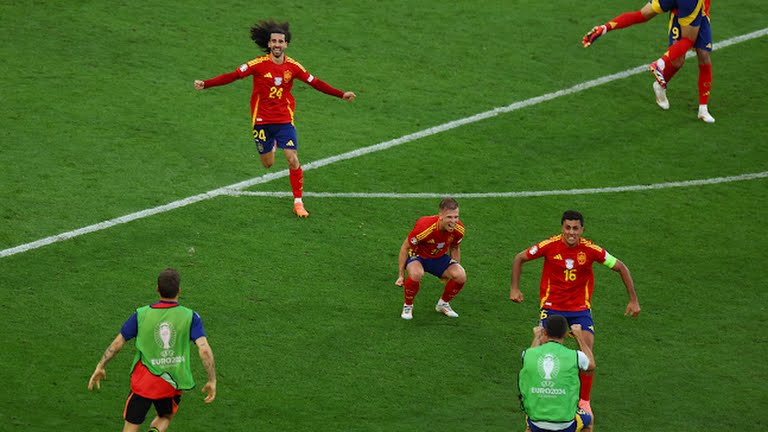And so it came to pass that the final touch of Toni Kroos’s storied career was also the final kick of this two-hour kidney-punch of a tournament game. Moments earlier Anthony Taylor’s own last act of an impossibly difficult refereeing assault course had been to award the free-kick that Kroos would float one last time into the Spanish area.
The ball was grabbed by Unai Simón, in the process sealing Germany’s exit from their own tournament. Almost as an afterthought Taylor had also just sent off Dani Carvajal for a deserved second yellow. It was just that kind of game, an endless matrix of score-settling and applied aggression.
At the final whistle Spain’s bench emptied on to the pitch and writhed and leapt in the gaps between the slumped white shirts, a startling tableau of stillness and manic energy. Antonio Rüdiger sat alone in the six-yard box, turned to stone as the red shirts frolicked and the stadium PA began to play a chirpy Spanish pop song, which might have felt insufficiently grand but for that point Noël Coward once made about the terrible pathos of cheap music.
The tournament had demanded that this game produce a spectacle. What it got instead was a different kind of brilliance, nasty and glowering and painful, refusing to adopt a shape or a set of easy patterns. This is what international football is like when it’s good, a showcase for the pain and beauty of these occasions. As the end it seemed remarkable Spain could still have two games left to play, that this wasn’t it. They will now move on to Munich for their semi-final, 2-1 winners here after extra time. Rüdiger will still be sat out there on Saturday morning.
There were phases here. Early on Germany came out to apply pressure to Spain’s callow midfield. In their best period, with the score 1-1 and time ticking down Germany began to play like someone else entirely. They played like West Germany, the team that knew how to win. Awkward, blond men with bruising thighs. Winning bastards. Power mullets. Robert Andrich was suddenly in the thick of things, a player whose mellow and progressive purple hair rinse is entirely misleading, who walks about the place like he has a small roll of carpet under each armpit.
Germany’s late equaliser was a wonderful old school thing, Joshua Kimmich, who always wanted to be Philipp Lahm, transforming himself instead into Thomas Berthold, leaping prodigiously to head back for Florian Wirtz to finish low into the corner and send the stadium into paroxysms.
Thomas Müller was on by now, waving his arms in people’s faces, leaving a knee in the back, turning the whole evening a shade of Müller. Frankly it was a relief to see Lamine Yamal off the pitch by then, not having to take part in this kind of post-watershed stuff. But then Lamine Yamal, and indeed Kroos, were also part of the decisive thread in this game. Football doesn’t really do karma or cosmic justice. Stuff just happens and you lasso some meaning around it. But there was a kind of flow chart here, one that took in Kroos’s knee, Kroos’s studs, Taylor’s refereeing, Germany’s aggression, and the righteous galloping power of both Lamine Yamal and Dani Olmo.
It stemmed from Kroos’s first meaningful kick of this game, the foul on Pedri that would end the Spain man’s involvement in the game. Taylor had a difficult game at times. Understandably so. It was full of people trying to make it difficult, to deceive him with fouls, dives, tugs, screams, blocks. Kroos was deep in the Spanish half when he committed an old man’s foul on Pedri, leaving his thigh there to stop a counterattack.
Taylor came scooting across. He didn’t book Kroos, presumably because he wanted to “let it flow” early on. But Germany had come out to do this, to apply some aggression, to be disruptive. The referee seemed to misread the energy in that moment, choosing leniency where some early boundaries might have altered the flow.

Pedri lasted three more minutes, departing in some distress after collapsing at the other end of the pitch. In the same move Kroos had also stamped on the foot of Lamine Yamal, leaving him also crumpled in a heap. But it was here the Karmic element began to enter. Pedri was replaced by Olmo, who would ultimately decide the game.
First things became nasty and niggly. For a while it was like watching Leeds versus Chelsea in 1970. Germany picked up bookings. Spain played for them a little, reading the dynamic.
Crucially one of these was against David Raum, the left-back. At which point Raum was basically doomed. This is not a good place to be, an hour to play, Lamine Yamal preparing to run at you.
And it was from that weak spot that Lamine Yamal made the opening goal, forcing Raum to stand away from him as he galloped forward, finding precisely the right ball across the edge of the area for Olmo, who tucked it beautifully into the corner.
And it would be Olmo an hour later who produced the perfect whipped cross for Mikel Merino’s winning goal, balletically executed, twisting and wrenching his neck in mid-air to generate the power and flight.
Germany had no time to respond. Spain had judged this perfectly, rattled a little by that early aggression, but maintaining their precision when the moment came. The manner of victory will give them great heart. We knew Spain could do fluent and clinical. Here they left the pitch with bruises and bumps and scrapes, but found their stride all the same.








More Stories
Amorim insists Fernandes not leaving Manchester United amid Madrid reports
How debt burden pushed Nigerian boxer Segun Olanrewaju to a fight that took his life
Nigeria Taekwondo Federation boss, Abdullahi Saidu dies at 53